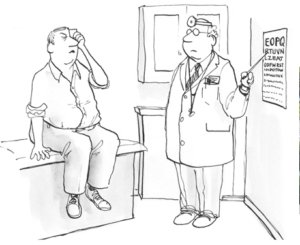Morning Report — Not Your Typical Medical Newsletter
We get it, you see a lot of medical newsletters, so hear us out. Twice a month, we’ll highlight important medical news sprinkled with witty commentary, fun facts, giveaways, and more… because learning should be fun! Subscribe to receive the Morning Report directly.
Introductions Are in Order
How rude of us. We’ve been writing this newsletter for several months and haven’t introduced ourselves! We are three “girl” moms (but we’re “not like regular moms—we’re cool moms”) who divide our time between developing CME for Pri-Med and braiding little-girl hair. If you would like to know more about us, here we are:
Alissa Scott, Lead Author
I’m a former English major who prefers the teachings of John Keating to J. Evans Pritchard, PhD (for all five of you Dead Poets Society fans). I love reading (exclusively autobiographies), writing, and graphic design, and I have scorching hot takes on em dashes. When I’m not contemplating bad puns and pop culture references for Morning Report, I’m either running, playing music, or debating my husband on the legality of the crane kick, the timeline of Ferris Bueller’s Day Off, or whether Uncle Rico would’ve “taken State” if he could go back in time.
Aylin Madore, MD, MEd, Author and Editor
LAfter the stark childhood realization that “putting down” an animal was not, in fact, placing Fido on the floor, I abruptly ended my pursuit of veterinary sciences and decided that (human) medicine was more my speed. However, animals are still near and dear to my heart, and when pressed to proclaim myself a dog person or cat person, I stand firmly in the middle as a lover of both species (im-paw-sible, some say?). I hope to one day get a dog to accompany my tailless cat, but for now, I have my hands full chasing a busy toddler around the house and wondering why koalas are not actual bears (they don’t meet the koalafications—duh!).
Shira Page, RN, NP, Author and Editor
Back before I became an NP, I was prancing around on the stage as an experimental theater actress at NYU’s Tisch School of the Arts. I studied alongside celebs such as Haley Joel Osment (The Sixth Sense) and can confirm that he does not see dead people. The important skills of using dark humor, moving like lightning while holding your pee, and dealing with big egos have all been impressively translatable to medicine.
New Study Sweetens the Pot for Sugar Reduction

Let’s face it—avoiding packaged foods (and the added sugar inside) poses a challenge for most Americans. Historically, efforts to curb this problem have hit as many speedbumps as a Clark W. Griswold family vacation. That is why in February 2021 the National Salt and Sugar Reduction Initiative (NSSRI)—originally focused on salt reduction—published its final sugar reduction targets and encouraged food and beverage companies to voluntarily adhere to these targets.
This seems like a sweet idea, but what do the potential long-term health and spending benefits look like?
Researchers created a model to simulate and quantify the effects of a 20% reduction in sugar from packaged foods and a 40% reduction in sugar in beverages. Here’s what they believe will happen over the lifetime of the current US adult population (ages 35-79):
- 2.48 million cardiovascular disease (CVD) events and 490,000 CVD deaths will be prevented
- 750,000 diabetes cases will be prevented
- 6.67 million quality-adjusted life-years will be gained
- $160.88 billion in net costs will be saved
Excellent news for consumers and the healthcare industry. Possible bad news for the food and beverage industry. Devastating news for Buddy the Elf.
Packaged foods have been part of the cultural wallpaper for generations, but their negative effects on the population’s health have been well documented. This study offers strong evidence that cutting the amount of sugar in these products will make a difference. These data should incentivize food and beverage companies to do their part, and many are already onboard. However, when reached for comment about his reduced-sugar Frosted Flakes, Tony the Tiger confirmed that he stands by his recent tweet: “They’re…okay.”
Did You Know?
In 1893, pharmacist Caleb Bradham invented “Brad’s Drink” in his small-town drug store in North Carolina. More than a hundred years later, you’ve probably consumed countless bottles of it and possibly used it to unclog a few drains. You guessed it! “Brad’s Drink” quickly became “Pepsi-Cola.” But do you know why he named it that? Because Bradham was convinced that his magic concoction of sugar, water, caramel, lemon oil, nutmeg, and cola nuts would aid in digestion, aka “pepsia” for those in medicine or who happen to speak Greek. Bradham marketed Pepsi as a health product that could ease digestion and increase energy. One thing life has taught us: if it tastes THAT good, it’s probably not good for us. Given what science has confirmed about the hazards of soda, this branding decision is Greek to us!
New USPSTF Diabetes Screening Recommendation

Given all this talk about sugar, we thought it fitting to bring up diabetes. The United States Preventive Services Task Force (USPSTF) lowered the screening age for prediabetes and type 2 diabetes mellitus from 40 to 35 (B recommendation). Specifically, the USPSTF recommends screening all nonpregnant adults ages 35 to 70 who have overweight or obesity and have no diabetic symptoms.
The screening age may be further lowered for Native American, Black, and Hispanic/Latinx populations because of their higher risk for diabetes. Those with a family history of early-onset diabetes may also require earlier screening.
The increasingly younger age of diabetes onset plus the established benefits of intervention across wide age ranges contributed to the lowered screening age. However, if the sugar-reduction prediction model holds true (see article above), perhaps the USPSTF will be able to revert back to its recommendation to screen at age 40. Here’s hoping!
Counting Your Flu Cases Before They Emerge

You know that scene in Office Space when Tom Smykowski discloses his get-rich-quick scheme to sell a “Jump to Conclusions” mat? (More specifically, a mat with written conclusions one can literally jump to.) Well, bear with us as we give his mat a try.
Two preprint publications suggest that after an almost nonexistent flu season, this upcoming season could be a doozy.
The extra precautions taken to prevent COVID-19, from social distancing to mask-wearing (the jury is still out on meticulously wiping all groceries with rubbing alcohol in the garage), have led to a 95% drop in flu-related deaths. Sadly, what was good news is also bad news. It turns out that to combat COVID-19, the US population may have “missed the opportunity to establish or boost their immunity [to the flu] for the future influenza season.” Some of you may have already noticed the increase in other respiratory infections, such as RSV, in your clinics. Well, the flu could be next.
So, what are the conclusions?
The two studies used slightly different prediction models, but both studies suggest that we may see around a 20% increase in flu cases in comparison with a typical season.
The silver lining
Both studies also found that flu vaccinations can help. In fact, by increasing flu vaccination rates by 10%, we could potentially reduce hospitalizations by up to 46%. We know, we know, vaccinations are a hot topic right now, but hopefully fear of the impending “twindemic”—a coinciding flu and COVID-19 epidemic—may change some minds.
Now, before we jump to any more conclusions—like that Erika Jayne knew about Tom Girardi’s money schemes—we should probably wait for the official peer review of these publications.
Medical Community to World Leaders: Treat Climate Change Like a Pandemic

The healthcare community is putting its full medical muscle behind efforts to combat climate change. In an unprecedented move, 220 editors from the world’s top medical and public-health journals published a joint editorial on the need for “urgent action to keep average global temperature increases below 1.5°C, halt the destruction of nature, and protect health.”
The editors called for world leaders to prioritize the lowering of emissions in the same way that they prioritized fighting COVID-19—in fact, the stakes may be even higher. Poorer health outcomes—both physical and mental—damage to ecosystems, and increased severe weather are the nonrefundable high cost of remaining on our current path. And we’ve already begun to pay it.
As you know, members of the medical community tend to be movers and shakers, and they don’t sit idly by when a crisis arises. This united effort is a full-throated demand for action. We hope this editorial galvanizes the world’s leaders into meaningful action. Feel free to forward this newsletter to any world leaders you may know.
Cartoon Caption Contest
If you think you have an amusing caption for the following image, please leave your idea in the comments section of this Facebook post by Monday, September 13, at 11:59pm ET for a chance to win our caption contest.
We’ll share our three favorite captions on Facebook Tuesday, September 14, so you can vote for your favorite.
The caption with the most votes will be featured in the next issue of Morning Report. Oh, and we’ll also send the winner a $50 Amazon gift card!* We know we have some creative readers, so give it a go!
*Restrictions apply, see www.amazon.com/gc-legal.

Rapid-Fire COVID-19 Updates
Moderna beats Pfizer-BioNTech in antibody count
New research has shown that one shot of the Moderna COVID-19 vaccine produces more than double the number of antibodies of one shot of the Pfizer-BioNTech vaccine. However, the research did not determine whether these additional antibodies affect the efficacy, which is >90% in both vaccines.
Case report of teacher spreading COVID-19 to students
The CDC published a case report of an unvaccinated California elementary school teacher who spread the Delta variant to half the students in the class in May of this year. The teacher taught for two days while experiencing symptoms and not wearing a mask, despite the school’s indoor masking policy. Key takeaway: the Delta variant is highly transmissible, so recommend vaccination and the usual prevention measures.
Interested in more healthcare news? Here are some other articles we don’t want you to miss:
- Cannabis and Tobacco Use Prior to Pregnancy and Subsequent Offspring Birth Outcomes: a 20-Year Intergenerational Prospective Cohort Study
- Notes From the Field: Vitamin D–Deficient Rickets and Severe Hypocalcemia in Infants Fed Homemade Alkaline Diet Formula – Three States, August 2020–February 2021
- Telemedicine Appointments Reduce Risk of Further Illness
- Light-to-Moderate Coffee Drinking Associated With Health Benefits
- Effect of Salt Substitution on Cardiovascular Events and Death
- Symptom Experience During the Late Reproductive Stage and the Menopausal Transition: Observations From the Women Living Better Survey
- Reducing Sugar in Packaged Foods Can Prevent Disease in Millions
- Variation in Newborn Skincare Policies Across United States Maternity Hospitals
- HIV Vaccine Candidate Does Not Sufficiently Protect Women Against HIV Infection
Would you like to share your feedback with Morning Report? Drop us an email at morningreport@pri-med.com and let us know how we’re doing.
Please note that the summaries in Morning Report are intended to provide clinicians with a brief overview of an article, and while we do our best to select the most salient points, we ask that you please read the full article linked in each summary for clarification before making any practice-changing decisions.
Enjoying Morning Report? Subscribe & Share It With Your Colleagues!
Is Morning Report for you? It is if…
You’re someone who needs quick-hitting, accurate medical news and you’re a fun and witty healthcare professional who wants your news with some flare.
You don’t just need to know about the latest metabolism study–you need to know how it parallels an Alanis Morissette hit. If you’re reading about acupuncture treatment, you need us to skip the needle puns and get right to the point. We keep things simple, but when we do get into the scientific weeds, we always remind you to check for ticks.
Subscribe to receive the Morning Report directly to your inbox every other Saturday.


